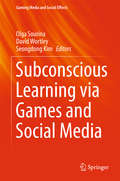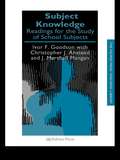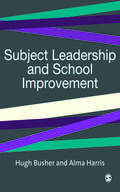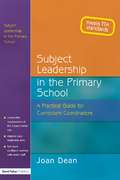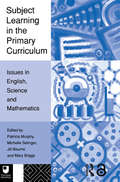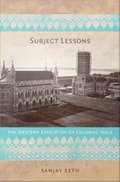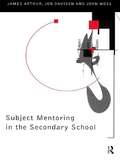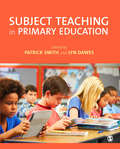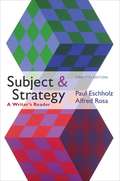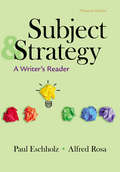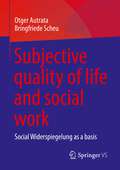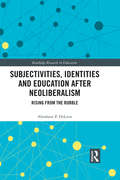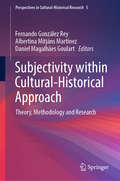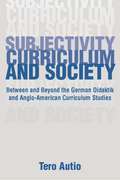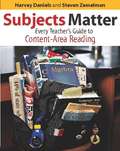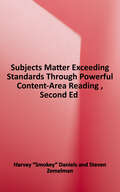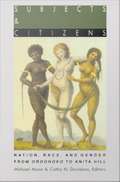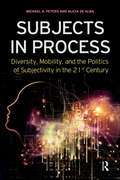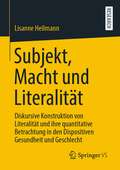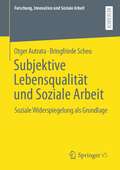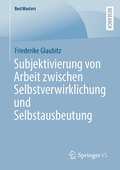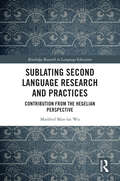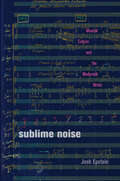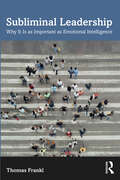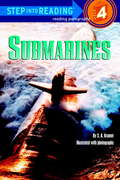- Table View
- List View
Subconscious Learning via Games and Social Media
by Olga Sourina David Wortley Seongdong KimThis book provides a detailed update on the applications of Serious Games in Healthcare and Education sector. In short, it provides an all rounded research and industry updates about the current and future advances in this area. These are the two sectors that are developing rapidly with direct applications of serious games. With advances in technologies and a new perspective on patient engagement and public expectations, the healthcare sector is increasingly turning to serious games to solve problems. Subconscious Learning via Games and Social Media will share expert opinions on the development and application of game technologies for health-related serious games. Our commercial and non-commercial expert comes from different aspects of the healthcare system from clinicians to therapist. The scope ranges from population health to specific medical domain applications. In the education sector, digital games have a great potential to improve learning of both adults and children. It is important to understand how to design games that could create long term behavioral change rather than short term alterations. In these chapters, we discuss how the serious games should be designed and deployed for both adults and children.
Subject Knowledge: Readings For The Study Of School Subjects (Teachers' Library)
by Ivor F Goodson Christopher J. Anstead J. Marshall ManganSchool knowledge has been a subject for historians, notably in the field of history of education. concentrating on the educational aspects of particular historical periods, however, links with contemporary education have often remained undeveloped.; This text attempts to account for the growth of increased interest by sociologists and others in school subjects since the 1960s. Goodson's analysis of his own work in the UK and North America examines the range of insights afforded of the nature of schooling and teaching through the study of school subjects.
Subject Leadership and School Improvement (Published in association with the British Educational Leadership and Management Society)
by Alma Harris Hugh Busher Christine WiseCurriculum and subject leadership in schools has recently gained substantial attention from both researchers and policy-makers. The Teacher Training Agency (TTA) has reinforced the importance of subject leadership in school improvement, proposing a new measure of such leadership competence through the creation of national subject leader standards (NPQSL). Subject Leadership and School Improvement reflects critically on the work of subject and curriculum leaders especially in schools in England and Wales, that is, those within the policy framework of The National Curriculum and the Teacher Training Agency. The book debates the functions of subject leaders in primary and secondary schools, using current research-based conceptual frameworks, and considers how they can bring about improvement and change with their colleagues in their subject areas. It emphasizes what is particular about leading and managing the middle realm of education organizations, showing how structural, cultural and individual imperatives and perspectives interact with each other in the professional practice of being a subject leader. The book is of interest not only to subject leaders and curriculum co-ordinators, to help them reflect rigorously on their practice, but also to those responsible for supervising them, such as headteachers and school governors, as well as for those accountable to them. It will be a useful text for serving teachers undertaking higher degrees programmes or programmes for gaining national standards qualifications, the National Professional Qualification for Headteachers (NPQH) as much as for the NPQSL (National Professional Qualification for Subject Leaders) when it is implemented.
Subject Leadership in the Primary School: A Practical Guide for Curriculum Coordinators
by Joan DeanFirst Published in 2004. Routledge is an imprint of Taylor & Francis, an informa company.
Subject Learning in the Primary Curriculum: Issues in English, Science and Maths
by Mary Briggs Jill Bourne Patricia Murphy Michelle SelingerThe emphasis on subject knowledge in primary curricula is a world-wide phenomenon and has become increasingly the focus of attention in England, with the introduction of the National Curriculum and the appointment of subject co-ordinators in schools. Yet what exactly constitutes a subject and its practice remains controversial. The book is organised into five parts. Part one examines the general aims of primary education, in order to give a background for a more detailed exploration of UK curriculum development. Parts two, three and four examine the core subjects of English, science and mathematics, whilst constantly bearing in mind the full range of views about the purpose of education and the nature of knowledge. Part five introduces key debates about approaches to knowledge, and raises issues about the future organisation of the curriculum. Subject Learning in the Primary Curriculum is the OU reader for Module 832, Teaching and Learning in the Primary Core Curriculum in the MA in Education.
Subject Lessons: The Western Education of Colonial India
by Sanjay SethSubject Lessons offers a fascinating account of how western knowledge "traveled" to India, changed that which it encountered, and was itself transformed in the process. Beginning in 1835, India's British rulers funded schools and universities to disseminate modern, western knowledge in the expectation that it would gradually replace indigenous ways of knowing. From the start, western education was endowed with great significance in India, not only by the colonizers but also by the colonized, to the extent that today almost all "serious" knowledge about India--even within India--is based on western epistemologies. In Subject Lessons, Sanjay Seth's investigation into how western knowledge was received by Indians under colonial rule becomes a broader inquiry into how modern, western epistemology came to be seen not merely as one way of knowing among others but as knowledge itself. Drawing on history, political science, anthropology, and philosophy, Seth interprets the debates and controversies that came to surround western education. Central among these were concerns that Indian students were acquiring western education by rote memorization--and were therefore not acquiring "true knowledge"--and that western education had plunged Indian students into a moral crisis, leaving them torn between modern, western knowledge and traditional Indian beliefs. Seth argues that these concerns, voiced by the British as well as by nationalists, reflected the anxiety that western education was failing to produce the modern subjects it presupposed. This failure suggested that western knowledge was not the universal epistemology it was thought to be. Turning to the production of collective identities, Seth illuminates the nationalists' position vis--vis western education--which they both sought and criticized--through analyses of discussions about the education of Muslims and women.
Subject Mentoring in the Secondary School
by John Moss James Arthur Jon DavisonStudent teachers have always worked with professionals during their teaching practice, but as teacher training becomes more school based, the role of the mentor has become much more important. Even newer is the emergence of the subject mentor. This book is an examination of the nature of effective mentoring and its contribution to student teacher development. Part One of the book has a broad perspective and looks at policy developments and the differing approaches to teacher education. Part Two explores central issues which have emerged in the author's research with mentors. It identifies tendencies in subject mentoring which characterise the work of subject mentors in schools, and key aspects of mentoring are examined, such as collaborative teaching, observation and the practice of discursive mentoring.
Subject Teaching in Primary Education
by Patrick Smith Lyn Dawes′An essential read for trainee and newly qualified teachers covering all key areas of the primary curriculum. There is a real sense of experienced and enthusiastic practitioners writing about "what makes good" and why, with lots of clear practical examples of how to put ideas into practice.′ - Jackie Keith, Deputy Head and Programme Leader for School Direct, London East Teacher Training Alliance To be a successful teacher in primary schools you need to have an informed understanding of a wide range of subjects. This book provides clear guidance of good practice teaching different subjects in primary education, informed by current curriculum directions, and full of practical advice for the classroom. Key features: Clear links to the 2014 National Curriculum in England ′In the classroom′ examples from schools demonstrate intelligent and engaging ways to teach different subjects Reflective questions challenge you to critically engage with what you have read and apply it to your own teaching This is essential reading for students on primary initial teacher education courses, including university-based (PGCE, BA QTS, BEd), school-based (SCITT, School Direct) and employment-based routes into teaching.
Subject and Strategy
by Paul Eschholz Alfred RosaSubject & Strategyhelps students write by offering engaging, teachable readings supported by time-tested pedagogy. Its mix of beloved classics and timely current readings provides exceptional models of writing. Its proven advice on writing and reading, innovative classroom exercises, and engaging writing assignments guide students to choose the rhetorical strategy that best suits their subject and then to use that strategy to achieve their writing purpose. Features include annotated student essays in each mode, extensive apparatus supporting every selection, and a "Writers on Writing" chapter that helps students see themselves as writers. And this classic reader is priced $15-30 less than similar competing readers.
Subject and Strategy: A Writer's Reader
by Paul Eschholz Al RosaConnecting reading and writing to the work students do in their other courses and to reading and writing in the workplace, Subject & Strategy goes beyond other rhetorical readers in the accessible writing instruction if offers at such an affordable price. This text provides the strategies your students need to approach any writing subject. With engaging readings, innovative classroom exercises, and effective writing assignments, Subject & Strategy guides students in selecting, practicing, and mastering writing strategies that will help them succeed in any discipline or career track they choose. Students are encouraged to see themselves as writers, and thorough coverage of reading and writing, research, documentation, and grammar provides a foundation for success.
Subjective quality of life and social work: Social Widerspiegelung as a basis
by Bringfriede Scheu Otger AutrataSocial Widerspiegelung is a central area of human life, however, it has been little researched for the theorization of social work. Otger Autrata and Bringfriede Scheu present the foundations of social Widerspiegelung and establish the essential connection between social Widerspiegelung and subjective quality of life. This makes an important contribution to the development of social work theory: The basic research on social Widerspiegelung is linked to the tasks of social work in discipline and profession.
Subjectivities, Identities, and Education after Neoliberalism: Rising from the Rubble (Routledge Research in Education #41)
by Abraham P. DeLeonIn this book, DeLeon presents a critique of neoliberalism and present times through a metaphor of social collapse and considers what remains once the dust has settled for a different kind of person to emerge. Engaging a variety of social, political and educational theories, along with pop culture and literature, DeLeon positions humanity at the edges of collapse and what will emerge after the fall. Engaging academic and fictional alternatives, he imagines future possibilities through a new kind of person that rises from the rubble. Questioning the foundations of empiricism, standardization and "reproducible" results that reject new forms of social and political projects from materializing, DeLeon discusses the potentials of the imagination and the ways in which it can produce alternative possibilities for our collective future when unleashed and combined with fictional narratives. Moving across multiple intellectual, philosophical, artistic, and historical traditions, he constructs a radical, interdisciplinary vision that challenges us to think about transforming our collective future(s), one in which we construct a new kind of person ready to tackle the challenges of a potentially liberatory future and what this might entail.
Subjectivity within Cultural-Historical Approach
by Fernando González Rey Albertina Mitjáns Martínez Daniel Magalhães GoulartThis book offers a theoretical and epistemological-methodological framework as an alternative approach to the instrumental-descriptive methodology that has prevailed in psychology to date. It discusses the differences between the proposed approach and other theoretical and methodological positions, such as discourse analysis, phenomenology and hermeneutics. Further, it puts forward a proposal that allows the demands of studying subjectivity to be addressed from a cultural-historical standpoint. The book mainly highlights case studies that have been conducted in various countries, and which employ or depart from the theoretical, epistemological and methodological proposals that guide this book. The research discussed here introduces readers to new discussions on theoretical and methodological issues in subjectivity that have increasingly attracted interest.
Subjectivity, Curriculum, and Society: Between and Beyond the German Didaktik and Anglo-American Curriculum Studies (Studies In Curriculum Theory Ser.)
by Tero AutioIn this book Tero Autio traces not only the key philosophical currents that structure traditional Anglo-American instrumental curriculum theory and Didaktik theories of curriculum which are lesser-known in the U.S., but also the divide between them and, implicitly, the opportunities for traversing this divide. Using careful historical and theoretic
Subjects Matter: Every Teacher's Guide to Content Area Reading
by Harvey Daniels ; Steven ZemelmanFinally, a book about content-area reading that’s just as useful to math, science, and history teachers as it is to English teachers! Lively, practical, and irreverent, Subjects Matter points the way to activities and materials that energize content and engage students across all subject areas.
Subjects Matter: Exceeding Standards Through Powerful Content-Area Reading
by Harvey Smokey" Daniels Steven ZemelmanWe are specialists to the bone-in science, math, social studies, art, music, business, and foreign language. But now, the Common Core and state standards require us to help our students better understand the distinctive texts in our subject areas. "Nobody's making us into reading teachers," write Smokey Daniels and Steve Zemelman, "but we must become teachers of disciplinary thinking through our students' reading." <p><p>If this shift sounds like a tough one, Subjects Matter, Second Edition is your solution. Smokey and Steve, two of America's most popular educators, share exactly what you need to help students read your nonfiction content closely and strategically: <p>•27 proven teaching strategies that help meet-and exceed-the standards <p>•how-to suggestions for engaging kids with content through wide, real-world reading <p>•a lively look at using "boring" textbooks <p>•motivating instruction that's powered by student collaboration <p>•specifics for helping struggling readers succeed. <p><p>Subjects Matter, Second Edition enables deep, thoughtful learning for your students, while keeping the irreverent, inspiring heart that's made the first edition indispensable. You'll discover fresh and re-energized lessons, completely updated research, and vibrant vignettes from new colleagues and old friends who have as much passion for their subjects as you do. <p><p>"We'll be using methods particular to our fields as well as engaging reading materials that help students understand and remember our content better," write Smokey and Steve. "We can realize that vision of the light going on in kids' heads and maybe fill them with enthusiasm about the amazing subject matter that we have to offer. Sound good? Let's get to work."
Subjects and Citizens: Nation, Race, and Gender from Oroonoko to Anita Hill
by Cathy N. Davidson Michael MoonFocusing on intersecting issues of nation, race, and gender, this volume inaugurates new models for American literary and cultural history. Subjects and Citizens reveals the many ways in which a wide range of canonical and non-canonical writing contends with the most crucial social, political, and literary issues of our past and present. Defining the landscape of the New American literary history, these essays are united by three interrelated concerns: ideas of origin (where does "American literature" begin?), ideas of nation (what does "American literature" mean?), and ideas of race and gender (what does "American literature" include and exclude and how?). Work by writers as diverse as Aphra Behn, James Fenimore Cooper, Edgar Allan Poe, Frances Harper, Harriet Beecher Stowe, Herman Melville, William Faulkner, Harriet Jacobs, Frederick Douglass, Abraham Lincoln, Bharati Mukherjee, Booker T. Washington, Mark Twain, Kate Chopin, Amrico Paredes, and Toni Morrison are discussed from several theoretical perspectives, using a variety of methodologies. Issues of the "frontier" and the "border" as well as those of coloniality and postcoloniality are explored. In each case, these essays emphasize the ideological nature of national identity and, more specifically, the centrality of race and gender to our concept of nationhood. Collected from recent issues of American Literature, with three new essays added, Subjects and Citizens charts the new directions being taken in American literary studies. Contributors. Daniel Cooper Alarcn, Lori Askeland, Stephanie Athey, Nancy Bentley, Lauren Berlant, Michele A. Birnbaum, Kristin Carter-Sanborn, Russ Castronovo, Joan Dayan, Julie Ellison, Sander L. Gilman, Karla F. C. Holloway, Annette Kolodny, Barbara Ladd, Lora Romero, Ramn Saldvar, Maggie Sale, Siobhan Senier, Timothy Sweet, Maurice Wallace, Elizabeth Young
Subjects in Process
by Michael A. Peters Alicia de AlbaSubjects in Process investigates the human subject in the first decade of the twenty-first century in relation to changing social circumstances and belongings. The concept of 'subjectivity' in the Western tradition has focused on the figure of the autonomous, self-conscious, and rooted individual. This book develops a conception of the subject that is nomadic and fluid rather than grounded and complete. Written from a perspective that takes account of globalisation - and the pressures that it places upon individuals and communities - this book draws upon Nietzsche and the post-modern thinkers that followed him. Arguing that a modern conception of the subject must be one based on cultural exchanges and transformations, this book is sure to provide new insights for anyone concerned with or interested in the identity of the individual now and in the future.
Subjekt, Macht und Literalität: Diskursive Konstruktion von Literalität und ihre quantitative Betrachtung in den Dispositiven Gesundheit und Geschlecht
by Lisanne Heilmann(Literale) Kompetenzen können – aus einer poststrukturalistischen Perspektive – nicht beobachtet, sondern nur zugeschrieben werden. Diese Zuschreibungen finden in diskursiven Anrufungen statt, in denen Individuen als kompetente oder inkompetente und als hoch oder gering literalisierte Subjekte adressiert und konstruiert werden. Lisanne Heilmann untersucht im vorliegenden Buch diese Zuschreibungen hinsichtlich ihrer komplexen Einbettung in (foucaultsche) Machtverhältnisse und die darin vorgenommenen Anrufungen und Formungen von literalen und literalisierten Subjekten. Aufbauend auf Foucault, Butler und die New Literacy Studies werden hier Literalitätsdiskurse in ihren komplexen Machtstrukturen und ambivalenten Subjektformungen analysiert und die Möglichkeiten quantitativer Forschung vor diesem Hintergrund erörtert. Die Autorin Lisanne Heilmann forscht insbesondere zu Fragen der Konstruktion von Grundkompetenz im Kontext von Geschlecht, Mehrsprachigkeit, Migration und Gesundheit. Sie ist die Koordinator*in des Projektes „Alltagsmathematik als Teil der Grundbildung Erwachsener (Hamburg Numeracy Project)“ und wissenschaftliche Mitarbeiter*in in der Studie „LEO 2018 – Leben mit geringer Literalität“.
Subjektive Lebensqualität und Soziale Arbeit: Soziale Widerspiegelung als Grundlage (Forschung, Innovation und Soziale Arbeit)
by Bringfriede Scheu Otger AutrataSoziale Widerspiegelung ist ein zentraler Bereich menschlichen Lebens, allerdings ist diese bisher für die Theoriebildung Sozialer Arbeit wenig erforscht. Otger Autrata und Bringfriede Scheu stellen Grundlagen sozialer Widerspiegelung dar und stellen den essentiellen Zusammenhang von sozialer Widerspiegelung und subjektiver Lebensqualität her. Damit wird ein wichtiger Beitrag zur Entfaltung von Theorie Sozialer Arbeit geleistet: Die Grundlagenforschung zu sozialer Widerspiegelung wird verknüpft mit den Aufgabenstellungen der Sozialen Arbeit in Disziplin und Profession.
Subjektivierung von Arbeit zwischen Selbstverwirklichung und Selbstausbeutung (BestMasters)
by Friederike GlaubitzDieses Buch gibt Einblicke in die historische Entwicklung des Wandels von Arbeitskraft aus Sicht der arbeits- und industriesoziologischen Forschung und beleuchtet dabei die Gründe für die spätmodernen Anforderungen an und Einforderungen von Lohnarbeitenden. Aufgrund von Strukturwandel und einem Paradigmenwechsel in der Arbeitsorganisation ab den 1970 / 80er Jahren erfordert die postmoderne Lohnarbeit von den Arbeitssubjekten verstärkt das Einbringen von subjektiven Potenzialen. Dabei sind z. B. Selbststrukturierung, -kontrolle und -ökonomisierung, aber auch eine unternehmerische Denkweise und motiviertes Arbeitshandeln gefragt, um die Tätigkeiten der heutigen Zeit ausführen zu können. Ab dem gleichen Zeitpunkt werden auf Beschäftigtenseite Ansprüche laut, die ebenfalls auf die Einbringung subjektiver Potenziale in die Lohnarbeit abzielen: Selbstentfaltung und -verwirklichung, die Vereinbarkeit von Arbeit und Privatleben sowie das ‚qualitativ gute Leben‘ werden gefordert. Beide Tendenzen werden arbeitswissenschaftlich als ‚doppelte Subjektivierung‘ zusammengefasst und in der vorliegenden Arbeit im Detail betrachtet sowie Chancen und Risiken dieser Entwicklung erörtert.
Sublating Second Language Research and Practices: Contribution from the Hegelian Perspective (Routledge Research in Language Education)
by Manfred Man-fat WuWu’s book provides an innovative perspective on, and recommendations for, the major aspects of second language (L2) teaching from a Hegelian anthro-philosophical perspective. Language is social in nature and is related to the larger social milieu. Hegelian philosophy of language complements existing research and theories on L2 learning by not only equipping them with a systematic framework but also broadening their scope. In Hegelian philosophy, language not only has its individual and interpersonal dimensions but is also related to the community, society, and morality. The Hegelian perspective also suggests a number of functions of L2 which have either been neglected or rejected by L2 researchers. This book highlights these neglected elements such as intersubjectivity, mutual recognition, universalization and objectivization of inner subjectivity of individuals, as well as moral enhancement. These concepts generate insights on the teaching and learning of L2. Wu’s volume also covers how the Hegelian anthro-philosophical perspective can help to re-interpret research results on L2 learner characteristics that are related to L2 learning to date such as L2 identity and autonomy. The book offers an alternative research paradigm, teaching philosophy, pedagogical implications, and suggestions for scholars, practitioners, and students in the professional field of L2 teaching.
Sublime Noise: Musical Culture and the Modernist Writer (Hopkins Studies in Modernism)
by Josh EpsteinWhat is the significance of noise in modernist music and literature?When Stravinsky’s Rite of Spring premiered in Paris in 1913, the crowd rioted in response to the harsh dissonance and jarring rhythms of its score. This was noise, not music. In Sublime Noise, Josh Epstein examines the significance of noise in modernist music and literature. How—and why—did composers and writers incorporate the noises of modern industry, warfare, and big-city life into their work?Epstein argues that, as the creative class engaged with the racket of cityscapes and new media, they reconsidered not just the aesthetic of music but also its cultural effects. Noise, after all, is more than a sonic category: it is a cultural value judgment—a way of abating and categorizing the sounds of a social space or of new music. Pulled into dialogue with modern music’s innovative rhythms, noise signaled the breakdown of art’s autonomy from social life—even the "old favorites" of Beethoven and Wagner took on new cultural meanings when circulated in noisy modern contexts. The use of noise also opened up the closed space of art to the pressures of publicity and technological mediation.Building both on literary cultural studies and work in the "new musicology," Sublime Noise examines the rich material relationship that exists between music and literature. Through close readings of modernist authors, including James Joyce, T. S. Eliot, Edith Sitwell, E. M. Forster, and Ezra Pound, and composers, including George Antheil, William Walton, Erik Satie, and Benjamin Britten, Epstein offers a radically contemporary account of musical-literary interactions that goes well beyond pure formalism. This book will be of interest to scholars of Anglophone literary modernism and to musicologists interested in how music was given new literary and cultural meaning during that complex interdisciplinary period.
Subliminal Leadership: Why It Is as Important as Emotional Intelligence
by Thomas FranklUnderstanding the power of subliminal influence makes or breaks leaders. What is it that subliminally motivates people to give their best, not just what’s in their job description? How do you build an outstanding team? (Spoiler: it’s not just by putting the best people in a team.) The answer lies in the power of subliminal influence. This book explains in a clear and accessible way this important, yet little known and understood, area of psychology and leadership. As Emotional Intelligence helped managers and leaders to understand the importance of empathy in the workplace, Subliminal Leadership takes us to the next level by explaining how influence through non-verbal communication mostly happens below the threshold of our conscious awareness: subliminal forms of body language and communication which influence other people's attitudes, thinking and behavior – and which may boost, or undermine a leader's authority, the performance of teams or the quality of key customer relationships. Readers will learn how we unconsciously communicate and how we positively or negatively influence other people in the process. Understanding subliminal influence will help people in, or aspiring towards, leadership positions to build trust, understand others’ emotions, make better decisions, and strengthen professional relationships. Based on recent scientific research in disciplines as diverse as psychology, evolutionary biology, anthropology, medicine, neuroscience, and management studies, the book offers a breakthrough, multidisciplinary approach to influence and leadership. This book is for everyone interested in the psychological, biological, and medical dimensions of leadership.
Submarines (Step into Reading)
by Sydelle KramerYoung readers are in for the most exciting trip of their lives as they venture into a nuclear submarine! While touring the vessel from bow to stern, they learn about the history and mechanics of subs, their military and scientific uses, and the incredible discomfort-and danger-of life onboard. Illustrated with photographs, this is easy-to-read, high-interest nonfiction at its most compelling!
